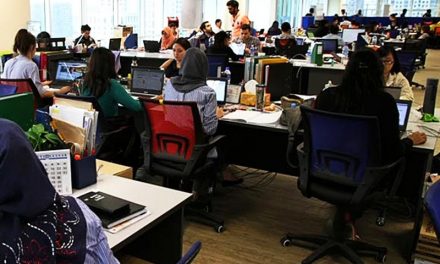KUALA LUMPUR: The 4.4 per cent increase in average monthly salaries for Malaysian workers last year is relatively insignificant when compared to the financial challenges they face, the Malaysian Trades Union Congress said today.
Its secretary-general J. Solomon said the rise, as revealed by the Department of Statistics Malaysia (DOSM) yesterday, should be evaluated together with relevant data from Bank Negara Malaysia (BNM) and other creditable bodies.
He urged lawmakers to re-examine the financial challenges faced by the average Malaysian employee.
“The 4.4 per cent hike in salary may seem commendable to some, however, if we were to compare it with the minimum wage in 2018 to 2019, which is an increase of RM3,087 to RM3,224, the percentage only represents a RM137 increase,” he said in a statement today.
olomon said a report released by BNM in 2017 had clearly stated that the monthly wage of a couple with two children living in big cities such as Kuala Lumpur should be touching around RM6,500; while the monthly wage should be RM2,700 for a single person.
“Moreover, the impact of the Covid-19 pandemic has shot up the cost of living, prices of goods and services.
“Compare that data to the data released by DOSM yesterday. It showed that an increase of RM137 is just a drop in the ocean, compared to what is actually needed by Malaysian workers and their families to secure a decent standard of living.”
Solomon said it is irrelevant to reference the 4.4 per cent increase in wages last year, as the income gap continues to widen in the country.
“The high unemployment and negative growth rate projected this year can only mean more and worse sufferings for Malaysian workers.
“While the monthly salary and wage for last year is averaged at RM3,244, it must be noted that tens of thousands of workers actually earn a monthly salary of around RM2,500 and some even need to put in extra shifts to hit the RM3,000 mark.
“The marginal 4.4 per cent average increase in salary last year also had minimal impact on the Employees Provident Fund (EPF) savings of the lower income groups. A majority of workers remain saddled with insufficient savings for their retirement needs including medical treatment.
“About two thirds of EPF contributors are reported to have less than RM50,000 in the fund, far below the estimated RM240,000 needed to sustain them post-retirement.
“These workers live in abject poverty and with little savings, forcing them to incur high debts to sustain their families,” said Solomon.
Yesterday, chief statistician Datuk Seri Dr Mohd Uzir Mahidin said the average monthly salary and wage received by employees in the country increased by 4.4 per cent from RM3,087 in 2018 to RM3,224 last year.
He revealed this based on data from the 2019 Salaries and Wages Survey Report published by DOSM yesterday.
The report provides the main statistics for salaries and wages, namely the monthly median and mean based on demography and the socio-economy.
On a related matter, Solomon urged the government to implement a mitigation policy that would address the problem of unemployment brought about by the Covid-19 pandemic.
He said this is based on Uzir’s statement about how the pandemic would affect the wages of workers in certain sectors.
“It (Uzir’s statement) implies that the various programmes introduced by the government have not achieved the desired economic recovery.
“Workers continue to face the possibility of being at high risk of job and income losses. The implications of reduced wages on the lives and livelihood of workers and their families, many of whom are in the bottom 40 per cent (B40) income category, needs serious attention from the government.
“He (Uzir) had specifically said that workers in wholesale and retail trade, repair of motor vehicles, transportation and storage sectors, accommodation industry, food and beverage services, and the arts, entertainment and recreational sectors are particularly expected to be affected.
“The government must introduce Emergency Employment Regulation which will bar employers from retrenching workers until the country’s economy recovers from the Covid-19 fallout. This will help ensure job security for workers, something which they desperately need in these difficult times,” he added.
Solomon urged the government to exhaust all avenues to protect the livelihoods of employees, as most of them are from the B40 group, who have been struggling to sustain themselves and their families








